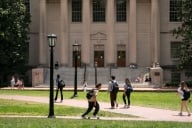You have /5 articles left.
Sign up for a free account or log in.
Benefits from New York State’s much-touted Excelsior Scholarship have gone to 3.2 percent of undergraduates statewide, and the free-tuition program has covered far more students outside New York City than in it, says a data brief released Friday.
Among the 3.2 percent of students receiving Excelsior Scholarships, just 20.7 percent attended institutions in the City University of New York system, according to the brief, which was prepared by the Center for an Urban Future, a think tank that collected data through a Freedom of Information Act request. That’s a lower percentage than might be expected based on statewide enrollment -- CUNY students represent 38 percent of all undergraduates enrolled in New York State.
Only 1.7 percent of CUNY students received awards through the Excelsior program. Meanwhile, 4.1 percent of students in the State University of New York system, which is spread out across areas outside New York City, received Excelsior awards.
The Center for an Urban Future counted one college in the state where at least 10 percent of enrolled students received Excelsior awards, SUNY Fredonia in Western New York, where 11.9 percent of students received scholarships under the program. CUNY’s Hostos Community College in the South Bronx had the lowest rate of Excelsior awards, with them covering 0.5 percent of its students.
A total of 43,513 out of 63,599 Excelsior applicants were denied -- 68 percent. The Center for an Urban Future blamed Excelsior’s requirement that students generally complete at least 30 credits per year for most denials.
The report is likely to escalate debate around Excelsior, which is entering its second year after it began covering students last fall. Last week, financial aid officers voiced concern that they did not have adequate guidance for implementing the program after it was put in place under a short timeline. State leaders at first reacted sharply but then provided new resources.
More broadly, Excelsior’s design and implementation timeline have been points of disagreement. Some observers called its structure byzantine, pointing to controversial design elements including credit requirements, work and residency requirements, and income limits that are scaling up in its first three years. But Governor Andrew Cuomo has touted it as one of his primary accomplishments as he seeks re-election, even as his Democratic opponent has called for changing it.
A release from the Center for an Urban Future called the program well intentioned but said the new data suggest Excelsior “needs to be overhauled to serve more of the students who are most in need of financial support.”
Cuomo’s allies, however, have pointed out that Excelsior was designed to layer on top of existing financial aid programs serving low-income students, like New York State’s Tuition Assistance Program. Earlier this summer they said about 45,000 students received free tuition after applying for the Excelsior Scholarship -- 23,000 through Excelsior funding and 22,000 through TAP.
The Cuomo camp’s Excelsior figure doesn’t quite line up with the data released by the Center for an Urban Future, which found 20,086 students attending colleges and community colleges in the state benefited from Excelsior.
Cuomo's backers took issue with several elements of the report, arguing applicant numbers were incorrect and that the report uses head-count figures that include anyone taking even one course, which is not the set of students the program targets.
A spokesman in the governor's office provided a statement pushing back against the new report.
"We are pleased to announce that New York State's free college programs pays [sic] 100 percent tuition for 53 percent -- or 210,000 -- full-time SUNY and CUNY students, and we are proud to be the only state to do so in the nation," it said. "Eighty-two thousand CUNY students, or 56 percent of total full-time enrollment, already go to school tuition-free because of existing assistance programs. We are proud that with Excelsior, thousands more are attending college for free this year. By incentivizing on-time graduation, the Excelsior program aims to lower overall loan debt, but the program allows for flexibility to accommodate students who cannot meet the credits requirement. New York is expanding college access and making it affordable, and the Center for an Urban Future shouldn’t stand in the way of that progress."







